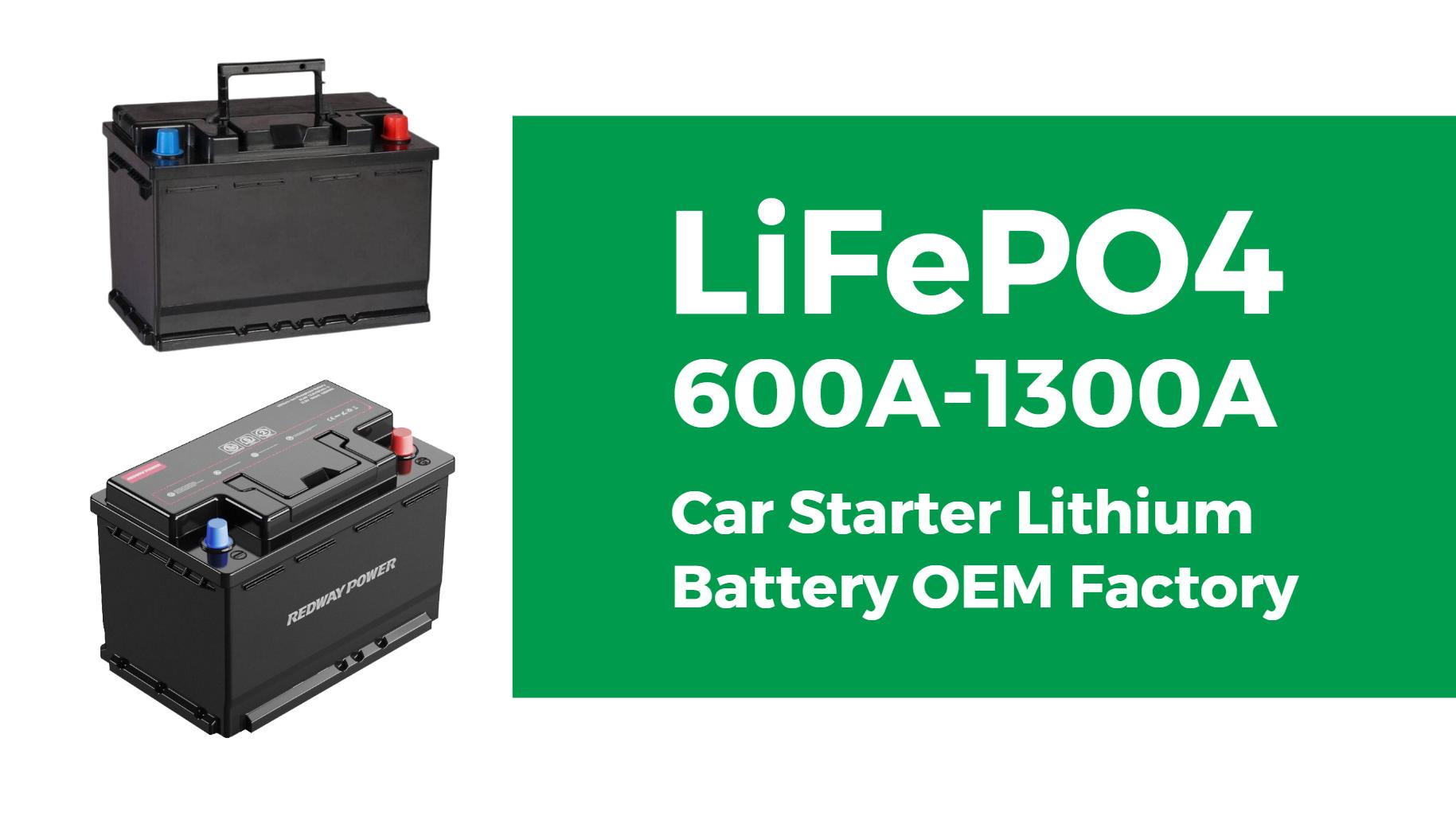
How Are LiFePO4 Car Starter Batteries Evolving in the Market?
LiFePO4 car starter batteries are transforming the automotive industry with longer lifespans, faster charging, and superior safety compared to lead-acid types. They deliver consistent voltage even in extreme temperatures, enhance fuel efficiency, and support start-stop systems. Redway ESS leads this evolution by manufacturing OEM-grade LiFePO4 starter batteries that provide reliable, eco-friendly, and high-performance energy solutions for modern and hybrid vehicles.
What Technological Advancements Are Driving LiFePO4 Battery Innovation?
Technological progress in LiFePO4 batteries has accelerated their adoption across the automotive sector. Innovations are centered on enhancing performance, durability, and user control while maintaining safety and cost-efficiency.
Key breakthroughs include:
-
Nano-coated cathodes and graphene-enhanced anodes: Improve ion conductivity and energy density.
-
Bluetooth-enabled Battery Management Systems (BMS): Enable real-time diagnostics and predictive maintenance.
-
Self-healing electrolytes: Automatically repair micro-damage to extend battery life and reliability.
-
Cold-start technology: Supports dependable ignition at sub-zero temperatures.
-
Solid-state and hybrid configurations: Integrate regenerative braking and ceramic electrolytes for better energy recovery and stability.
| Feature | 2020 Models | 2025 Models |
|---|---|---|
| Cold Cranking Amps (CCA) | 650A | 850A |
| Charge Speed | 4 hours | 1.2 hours |
| BMS Connectivity | Wired | Bluetooth 5.2 |
Modern LiFePO4 prototypes achieve 15% higher energy density and over 5,000 deep cycles, ensuring longer service life and improved efficiency in both ICE and hybrid systems. Redway ESS incorporates these innovations to deliver smarter, more reliable starter batteries tailored to OEM standards.
Why Are Automotive Manufacturers Adopting LiFePO4 for Starter Applications?
Automakers are shifting toward LiFePO4 starter batteries for their unmatched reliability, safety, and cost-effectiveness over time. These batteries align with automotive efficiency and environmental goals, offering benefits such as:
-
Improved fuel economy: Reduces fuel consumption by up to 12%.
-
Extended service life: 10-year lifespan matches typical vehicle warranties.
-
Superior safety: Operates safely up to 270°C, reducing thermal runaway risks.
-
Enhanced vibration resistance: Minimizes electrical failures in heavy-duty vehicles.
Redway ESS provides OEM-grade LiFePO4 batteries that meet stringent global standards. Their lightweight construction, rapid cranking ability, and long-term stability make them a trusted solution for automakers seeking advanced energy systems for conventional and hybrid vehicles.
How Does the Total Cost of Ownership Compare to Lead-Acid Batteries?
While LiFePO4 batteries have a higher initial cost, they offer substantial long-term savings through extended lifespan, reduced maintenance, and improved vehicle efficiency.
| Cost Factor | LiFePO4 | Lead-Acid |
|---|---|---|
| 10-Year Replacement Costs | $0 | $420 |
| Fuel Savings | $140 | $0 |
| Disposal Fees | $15 | $35 |
Key advantages include:
-
No maintenance or acid refills required.
-
Modular cell design simplifies repairs and reduces downtime.
-
Lightweight structure enhances handling and fuel efficiency.
-
ROI achievable within 18 months for commercial fleets.
For fleet managers and vehicle owners, the lower lifetime cost and operational benefits make LiFePO4 a superior choice. Redway ESS continues to optimize its production lines to deliver competitively priced OEM solutions that meet global market demand.
What Environmental Benefits Do LiFePO4 Starter Batteries Provide?
LiFePO4 batteries are designed with sustainability at their core, offering a cleaner and safer alternative to lead-acid batteries. Their chemistry eliminates toxic materials and supports circular economy initiatives.
Environmental advantages include:
-
62% lower lifecycle CO₂ emissions compared to lead-acid batteries.
-
98% recyclability rate of materials.
-
Non-toxic components, eliminating lead and acid pollution.
-
Reduced raw material use, requiring only 1.4 kg of lithium versus 18 kg of lead per 60Ah unit.
These benefits align with the global push for greener mobility solutions. Redway ESS integrates eco-conscious manufacturing practices and ensures every LiFePO4 battery meets international environmental standards.
Redway ESS Expert Views
“LiFePO4 starter batteries mark a major milestone in automotive power technology,” says Dr. Elena Voss, Chief Engineer at Redway ESS. “Their stable chemistry, high discharge efficiency, and compatibility with advanced vehicle electronics ensure exceptional reliability. Our in-house testing confirms up to 4,000 stable cycles, superior cold-start performance, and near-zero maintenance. Redway ESS continues to pioneer sustainable, high-efficiency lithium solutions that meet the demands of modern OEMs worldwide.”
Conclusion
LiFePO4 car starter batteries are reshaping the future of automotive energy systems with superior safety, faster charging, and longer lifespans. Their lightweight and modular designs improve vehicle efficiency while supporting environmental sustainability. With ongoing innovation, Redway ESS stands at the forefront, offering OEM-grade LiFePO4 solutions that redefine performance, cost-effectiveness, and eco-responsibility for the automotive industry.
Frequently Asked Questions
Can LiFePO4 starters be used in classic cars?
Yes. When equipped with voltage regulators, LiFePO4 batteries can power classic vehicles safely and efficiently.
Do LiFePO4 batteries require special charging systems?
Not necessarily. Most LiFePO4 units include a built-in BMS compatible with standard alternators.
How long do LiFePO4 starter batteries last?
Typically 3–5 times longer than lead-acid batteries, often exceeding 10 years of operation.
Are LiFePO4 batteries safe after vehicle collisions?
Yes. Certified units feature impact-triggered disconnection, preventing electrical hazards and fires.
Can they operate in extreme temperatures?
Yes. Premium LiFePO4 models support starts at –40°C and maintain stability up to 60°C, suitable for global conditions.
